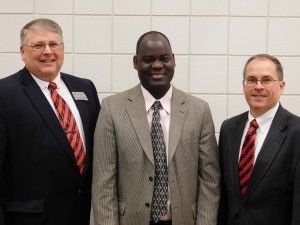We are proud to announce that our former MBA student Paul Okello, is the first recipient of the newly-created Edgar S. McFadden Graduate Student Scholarship in Plant Science at South Dakota State University.
Paul Okello, who is in the second year of his doctoral studies, is conducting research on root rot caused by Fusarium species and their interaction with soybean cyst nematode on soybean. Paul Okello compares healthy soybeans with ones infected by Fusarium proliferatum. He identified 10 Fusarium pathogens in plant samples from South Dakota soybean fields.
SDSU doctoral student Paul Okello compares healthy soybeans with ones infected by Fusarium proliferatum. He identified 10 Fusarium pathogens in plant samples from South Dakota soybean fields. Using South Dakota field samples, Okello has identified 10 Fusarium species that cause root rot and is screening soybean germplasm to help breeders develop resistant varieties. His research adviser is assistant professor Febina Mathew, a field crops pathologist.
“Paul is an extremely hardworking and focused student. His patience has really paid off and I am extremely confident that he can take this research to new heights,” Mathew said. The $3,000 scholarship is sponsored by the Foundation Seed Stock Division, South Dakota Crop Improvement Association and South Dakota Wheat Commission. It is awarded to a graduate student whose work focuses on plant breeding and/or pathology. “This scholarship comes with a personal responsibility to continue the McFadden legacy,” Okello said. In the early 1900s when stem rust was devastating the nation’s wheat crop, McFadden, then an undergraduate student at SDSU, developed a variety of spring wheat named Hope that was resistant to stem and leaf rust.
Paul Okello, center, a doctoral student in the SDSU Plant Science Department, receives the first McFadden Graduate Scholarship from Reid Christopherson, executive director of the South Dakota Wheat Commission, and Kevin Kephart, SDSU Vice President for Research and Economic Development
Paul Okello, center, a doctoral student in the SDSU Plant Science Department, receives the first McFadden Graduate Scholarship from Reid Christopherson, executive director of the South Dakota Wheat Commission, and Kevin Kephart, SDSU Vice President for Research and Economic Development
“Edgar S. McFadden was one of the most innovative plant geneticists in the first half of the 20th century and an extremely impactful SDSU alumnus,” according to Kevin Kephart, SDSU Vice President for Research and Economic Development.
“These are big shoes to fill,” added Okello, who earned his bachelor’s degree in natural resource management in his native Kenya and then an MBA at Swiss School of Management in Rome, Italy.
His interest in plant science began when he and his wife Sally moved to Ames, Iowa, where she studied plant pathology at Iowa State University. There Okello worked as a research assistant on corn research projects at the BASF Plant Science Division and also assisted an Iowa State postdoctoral researcher working on soybeans.
“The recognition goes to the team that has helped me accomplish so much in such a short time,” said Okello. “My adviser is always available to offer guidance and support.”
Using soybean germplasm from the U.S. Department of Agriculture, Urbana, Illinois, Okello is screening 246 plant introduction soybean lines belonging to early maturity groups for tolerance to the Fusarium species. This work is supported by the South Dakota Soybean Promotion and Research Council and the North Central Soybean Research Program.
A few commercial soybean varieties grown in South Dakota are tolerant to Fusarium virguliforme, which causes sudden death syndrome; however, breeders have yet to develop cultivars that can tolerate the other nine Fusarium pathogens.
Okello has identified 13 soybean genotypes with possible resistance to Fusarium proliferatum, the most aggressive of the root rot pathogens, and at least one that may have resistance to four Fusarium species in his preliminary experiments. These soybean lines may be used as parent material to develop commercial soybean cultivars with resistance to Fusarium species.
“I am hoping that I will be able to make a difference,” Okello said. “Wherever I will be in the future, I will think of what Edgar did and what I can do to carry on his legacy. I have the responsibility to chart the path for future McFadden scholars.”

